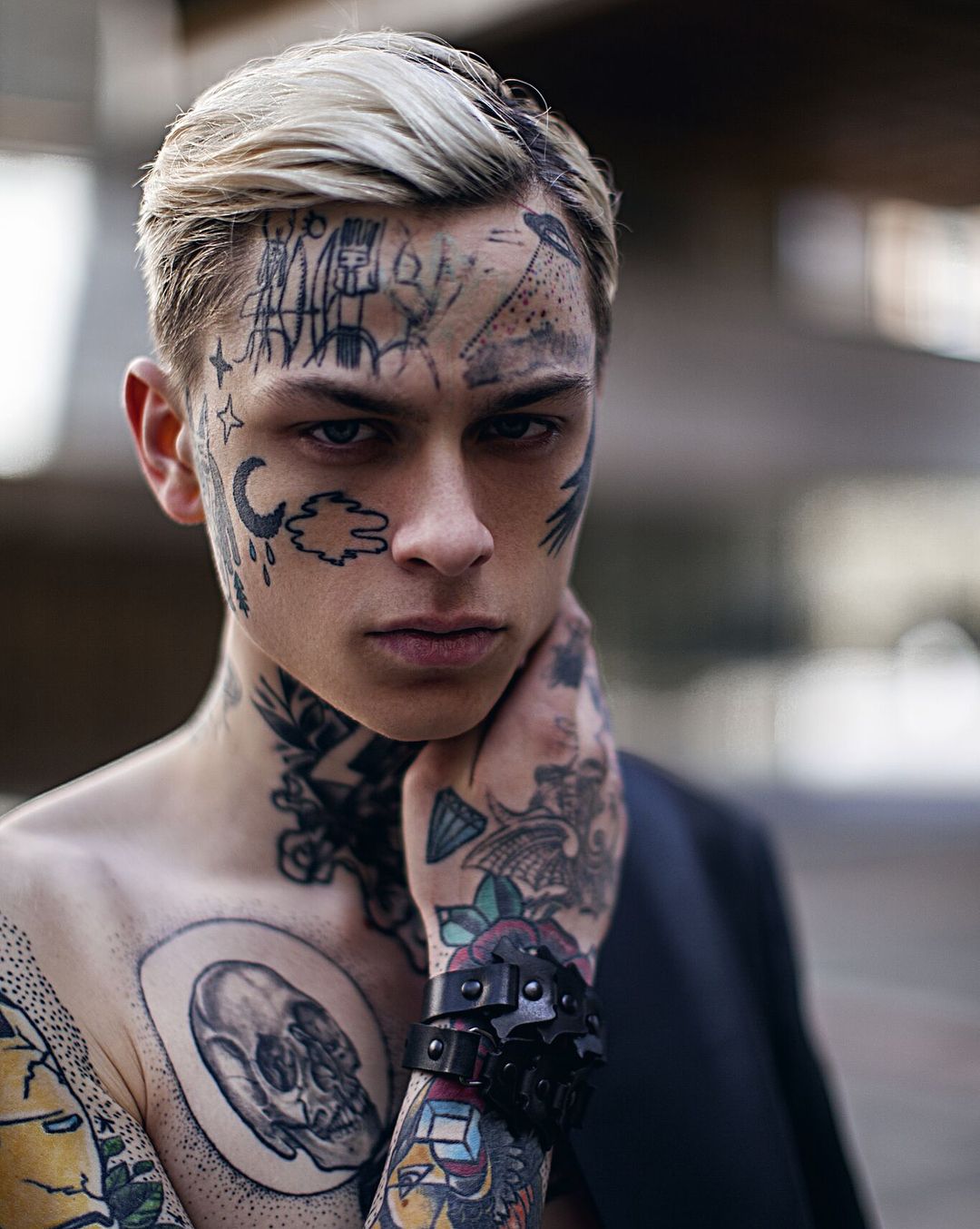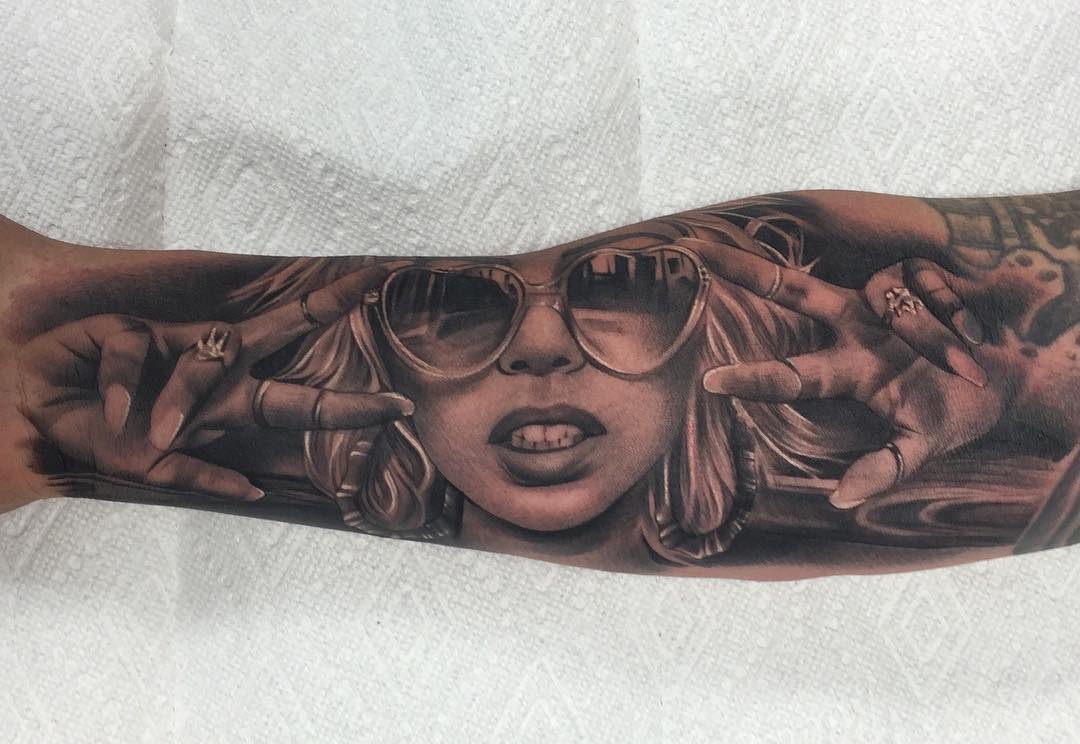The art of tattooing has evolved significantly over the years, with an increasing number of individuals opting for bold and expressive body modifications. Among these, face tattoos have emerged as a captivating and controversial trend, offering a unique form of self-expression that challenges societal norms. In this comprehensive exploration, we delve into the world of nice face tattoos, uncovering their history, cultural significance, and the artistic talent behind these captivating ink masterpieces.
The Evolution of Face Tattoos: A Historical Perspective

Face tattoos, much like other forms of body art, have a rich history that spans across diverse cultures and eras. From ancient civilizations to modern times, facial markings have served various purposes, from signifying tribal affiliation and religious devotion to marking rites of passage or indicating social status.
In ancient Egypt, for instance, facial tattoos held deep spiritual meaning. They were often used to honor deities or represent a person's connection to the divine. Similarly, indigenous cultures across the globe, such as the Maori of New Zealand, have a long tradition of intricate facial tattoos, known as moko, which are deeply rooted in cultural identity and tribal heritage.
The 19th and 20th centuries witnessed a shift in the perception of facial tattoos, particularly in Western societies. Tattoos, in general, were associated with sailors, criminals, and outcasts, and face tattoos were often seen as a sign of rebellion or a way to distance oneself from societal expectations. However, this negative perception began to evolve, especially with the rise of tattoo culture in the 1960s and 1970s, where tattoos became more mainstream and accepted as a form of personal artistic expression.
The Modern Appeal of Nice Face Tattoos

Today, face tattoos have gained a new level of popularity, with individuals embracing them as a bold and unapologetic form of self-expression. While the term “nice” may be subjective, it generally refers to tattoos that are aesthetically pleasing, well-executed, and often reflect the wearer’s personality or beliefs.
The appeal of nice face tattoos lies in their ability to make a powerful statement. They are a permanent reminder of one's identity, a way to showcase individuality, and a form of artistic self-actualization. Face tattoos can range from small and subtle designs, like delicate line work or symbolic motifs, to larger, more intricate pieces that cover significant portions of the face.
Celebrities and Influencers Leading the Trend
The rise of social media and the influence of celebrities and influencers have played a significant role in normalizing face tattoos. Many famous figures, including musicians, actors, and social media personalities, have embraced face tattoos, showcasing their unique designs and personal stories behind them. These celebrities often serve as inspiration for those considering face tattoos, challenging societal perceptions and promoting self-acceptance.
For instance, the iconic facial tattoos of Mike Tyson, the former heavyweight boxing champion, have become a cultural reference point, symbolizing strength and defiance. Similarly, Post Malone, the popular musician, has a series of distinctive face tattoos that have become part of his brand and personal identity.
The Role of Tattoo Artists
The talent and creativity of tattoo artists are paramount in the world of face tattoos. These artists must possess not only exceptional technical skills but also a deep understanding of facial anatomy and the ability to create designs that complement the wearer’s features. The collaboration between the client and the artist is crucial, as face tattoos require meticulous planning and precision to ensure a harmonious and aesthetically pleasing result.
Many renowned tattoo artists have built their reputation on their mastery of face tattoos. Their portfolios often showcase a diverse range of styles, from realistic portraits to abstract designs, all tailored to the individual preferences and personalities of their clients.
| Tattoo Artist | Specialty |
|---|---|
| Kat Von D | Realistic Portraits |
| Dr. Woo | Delicate Line Work |
| Scot Campebell | Abstract Geometrics |

The Impact of Face Tattoos on Personal and Professional Life
While face tattoos offer a unique form of self-expression, they also come with certain societal challenges and considerations. In many professional settings, tattoos, especially those on visible areas like the face, may be seen as a hindrance to career advancement or a source of discrimination.
However, there is a growing acceptance and appreciation for body art in various industries. Many companies are becoming more inclusive and open-minded, recognizing that tattoos do not define a person's work ethic or capabilities. Additionally, the rise of remote work and a more relaxed dress code in certain sectors has contributed to a shift in perspective, making face tattoos less of a career barrier.
It's important for individuals considering face tattoos to carefully weigh the potential social and professional implications. While the perception of tattoos is evolving, it's still essential to consider the context in which one presents oneself, both personally and professionally.
Self-Expression and Identity
For many, face tattoos are an integral part of their personal identity and a way to communicate their unique story. They serve as a reminder of personal growth, past experiences, or significant life events. Face tattoos can be a powerful tool for self-affirmation and a way to connect with like-minded individuals who appreciate and understand this form of body art.
The act of getting a face tattoo can be a transformative experience, empowering individuals to embrace their authenticity and challenge societal expectations. It is a bold statement of self-love and acceptance, a declaration that one's appearance is a reflection of their inner self and not a mere conformity to societal norms.
The Future of Face Tattoos: A Growing Acceptance
As societal attitudes continue to evolve, it’s likely that face tattoos will become even more accepted and embraced. The growing popularity of body art and the increasing visibility of tattooed individuals in various fields, including art, fashion, and entertainment, contribute to a more inclusive and diverse cultural landscape.
Furthermore, the increasing availability of high-quality tattoo removal procedures offers a sense of security for those considering face tattoos. While permanent, these tattoos can be altered or removed if desired, providing a level of flexibility that was not previously available.
The future of face tattoos promises a continued celebration of self-expression and individuality. As tattoo artists push the boundaries of creativity and clients embrace their unique stories, face tattoos will remain a captivating and controversial form of art, challenging societal norms and inspiring personal growth.
Are face tattoos painful?
+Face tattoos, like any other tattoo, can be uncomfortable during the process. The sensitivity of facial skin and the proximity to sensitive areas like the eyes and mouth can make the experience more intense. However, with proper numbing techniques and an experienced tattoo artist, the pain can be managed effectively.
How much do face tattoos cost?
+The cost of face tattoos can vary significantly based on factors such as the size and complexity of the design, the reputation of the artist, and the location of the tattoo studio. On average, a small face tattoo can range from 100 to 300, while larger, more intricate pieces can cost upwards of $1000 or more.
Are face tattoos permanent?
+Yes, face tattoos are considered permanent. Unlike temporary tattoos or body paint, face tattoos involve the injection of ink into the dermal layer of the skin, making them long-lasting. However, with advancements in laser tattoo removal technology, it is possible to fade or remove face tattoos if desired.